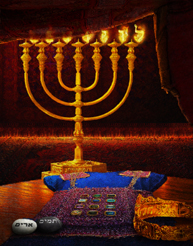 Levi לֵוִי
Levi לֵוִי
What imageries are included in the depiction of Levi?
The image of the tribe of Levi depicts the inside of the tabernacle tent with a view toward the curtain that separates the Holy of Holies. There is a glow at the bottom of the curtain to imply the Glory of the L-rd behind the veil. On the left stands the large golden seven branched menorah, which has the English and Hebrew letters for Levi hidden in the flames, implying that the High priest is ready for his service. He is already robed in white linen. Only the finishing touches like the ephod (blue outer garment), the breastplate, the priestly crown, and the Urim and Thummim stones need to be added in order for him to enter the Sanctuary and into the Shekinah.
The Meaning of the Name Levi
In Genesis 29:34 we find that Leah had already given Jacob two sons. She says: “Now my husband will be joined with me.” Levi means attached, joined to me or be joined (to the Lord).
The Biblical Blessings for the Tribe
Jacob’s blessing for the tribe of Levi is found in Gen. 49:5-7. It reads: “Simeon and Levi are brothers—their swords are weapons of violence. Let me not enter their council, let me not join their assembly, for they have killed men in their anger and hamstrung oxen as they pleased. Cursed be their anger, so fierce, and their fury, so cruel! I will scatter them in Jacob and disperse them in Israel.”
In Deut. 33:8-11, Moses said about Levi: “Your Thummim and Urim belong to your faithful servant. You tested him at Massah; you contended with him at the waters of Meribah.”
Although Levi in his youth acted out in anger and revenge and thus what Jacob had to say does not seem like a blessing, the Levites were distinguished as servants to G-d. This was due to their refusal to worship the Golden Calf found in Exodus 32:26-29, which states, “So Moses stood at the entrance to the camp and said, “Whoever is for the L-rd, come to me.” And all the Levites rallied to him.” Levi’s own three sons Gerhson, Kahath and Merari, became Temple servants and each filled different roles in the Tabernacle and later in the Temple services.
Tribal Symbols
The breastplate of the High priest (Cohen Hagadol) is the symbol of the tribe.
Tribal Territory
The Levites were the only Israelite tribe that received cities but were not allowed to be landowners because according to Deut. 18:12, “the L-rd the G-d of Israel Himself is their inheritance.” The Tribe of Levi served particular religious duties for the Israelites and had political responsibilities as well. In return, the landed tribes were expected to give tithe to the Levites, particularly the tithe known as the Maaser Rishon, or Levite Tithe.
Additional Notes
Historically, the Levites were the priestly classes in Judaism who had exclusive rights to learn and teach Torah to others. Moses and his brother, Aaron, were both Levites. Notable descendants of the Levite dynasty, according to the Bible, include Miriam, Samuel, Ezekiel, Ezra, and Malachi. The descendants of Aaron, who was the first kohen gadol (High priest) of Israel, were designated as the priestly class—the Kohanim. Therefore, the kohanim comprise a family dynasty. The role of the Levites included singing Psalms during Temple services, performing construction and maintenance for the Temple, keeping watch over it, and translating and explaining the Torah. They served as guards, teachers, judges, and maintained the cities of refuge in Biblical times.
In Egypt, the Levites were the only tribe that remained committed to G-d. During the Exodus, the Levite tribe was particularly zealous in protecting the Mosaic law in the face of those worshipping the Golden Calf, which may have been a reason for their priestly status.
The service done by the Levites was recorded in Numbers 18:2-6. “And with you bring your brother also, the tribe of Levi, the tribe of your father, that they may join you and minister to you while you and your sons with you are before the tent of the testimony.They shall keep guard over you and over the whole tent, but shall not come near to the vessels of the sanctuary or to the altar lest they, and you, die.They shall join you and keep guard over the tent of meeting for all the service of the tent, and no outsider shall come near you.And you shall keep guard over the sanctuary and over the altar, that there may never again be wrath on the people of Israel.And behold, I have taken your brothers the Levites from among the people of Israel. They are a gift to you, given to the Lord, to do the service of the tent of meeting.” Thus, they became an offering to the Lord in lieu of the firstborn, which were preserved during the Exodus from Egypt.